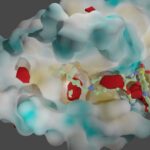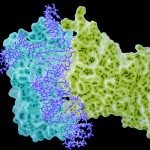Lien vers Pubmed [PMID] – 32320205
ACS Chem. Biol. 2020 Apr;
Protein-protein interactions (PPIs) mediate nearly every cellular process and represent attractive targets for modulating disease states but are challenging to target with small molecules. Despite this, several PPI inhibitors (iPPIs) have entered clinical trials, and a growing number of PPIs have become validated drug targets. However, high-throughput screening efforts still endure low hit rates mainly because of the use of unsuitable screening libraries. Here, we describe the collective effort of a French consortium to build, select and store in plates a unique chemical library dedicated to the inhibition of PPIs. Using two independent predictive models and two updated databases of experimentally confirmed PPI inhibitors developed by members of the consortium, we built models based on different training sets, molecular descriptors and machine learning methods. Independent statistical models were used to select putative PPI inhibitors from large commercial compound collections showing great complementarity. Medicinal chemistry filters were applied to remove undesirable structures from this set (such as PAINS, frequent hitters and toxic compounds) and to improve drug likeness. The remaining compounds were subjected to a clustering procedure to reduce the final size of the library while maintaining its chemical diversity. In practice, the library showed a 46-fold activity rate enhancement when compared to a non-iPPI-enriched diversity library in high-throughput screening against the CD47-SIRPα PPI. The Fr-PPIChem library is plated in 384-well plates and will be distributed on demand to the scientific community as a powerful tool for discovering new chemical probes and early hits for the development of potential therapeutic drugs.


